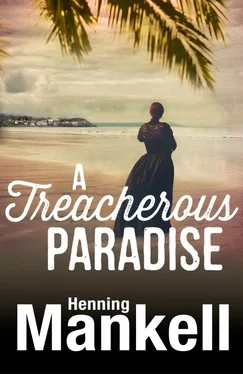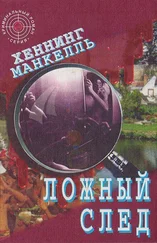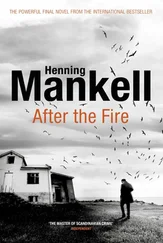Nunez stood up.
‘Perhaps you are not as lonely as you think,’ he said. ‘I share your disgust.’
He bowed and left. She thought about what he had said. Perhaps she had been wrong about him after all.
When she was alone she looked at the contracts and the bundles of banknotes. She had arrived in Africa with nothing: now she was very rich.
All she knew about her future was that she would travel to Beira and look for Isabel’s parents. What would happen after that she didn’t know, and it was something that she was somewhat afraid of. But before leaving she would have to have a final discussion with the women in the brothel, and also sort out a future for Carlos.
That evening, for the second time in their shared lives, she and Carlos sat together and counted all the money that was piled up in enormous heaps on tables and chairs.
The next morning Ana carefully dug out the photograph of her and Lundmark from their wedding in Algiers. It was only eighteen months since that occasion, but even so it seemed like another world and another age, when everything had a context and she always looked forward to the next day. Now it seemed to her that darkness was closing in all around her. She had a long way to go, and she didn’t know where the path would lead her. Moreover, she would have to do everything on her own. When she left the house by the river in the sleigh, she was not abandoning a large circle of friends, and although she was leaving behind her family, she had had Forsman’s broad back in front
of her. Now, though, she felt totally isolated. But she had no intention of giving up, the mucky angel still had its wings. She hated the gloom surrounding her on all sides, she missed all the happiness she had enjoyed. I’m a smiling angel, she thought. The life I’m leading at the moment will always be foreign to me.
As she looked at the photograph taken in the studio in Algiers, a thought struck her and she decided immediately to say a silent ‘yes’ to it. She made up her mind to hold her final talk in the brothel during the quiet hours of the afternoon. That would give her an opportunity of paying another visit to the photographer Picard first.
But she also made up her mind to do something that had hitherto never been more than a passing thought. She now realized that the time had come to actually do it. She had nothing to lose by surprising the women in the brothel in a way that none of them would ever have been able to imagine.
The whites who lived in Lourenço Marques had themselves photographed by Picard when they got married, celebrated a birthday or some other anniversary, or lay dead, waiting to be buried or shipped back to Portugal in a well-sealed zinc coffin. He never took photographs of black people on principle, but Ana knew that the amount of money she intended to offer him would ensure that he made an exception. Picard was a skilful photographer, but he was also greedy.
He was in the process of photographing a newborn baby when Ana entered his studio. The baby was crying and Picard, who hated taking photographs of unruly children, had stuffed his ears with cotton wool. As a result he didn’t hear Ana when she came into the room and sat down quietly on a chair. The mother holding the baby was very young. Ana thought it could well have been Berta sitting there with Forsman’s child in her lap. Ana could see that the mother was looking at the child without a trace of pleasure in her eyes, and assumed she was one of those young white women who are forced to move to the African continent by their husbands, and soon become desperate and scared by what they regard as the realm of unbearable terror.
Picard disappeared under his black cloth and took a picture of the screeching baby. It was only after he had more or less shooed the woman and her child out of his studio that he noticed Ana. He took the cotton wool out of his ears, and bowed.
‘Do you have an appointment?’ he asked, looking worried. ‘If so my secretary hasn’t been doing her job properly.’
‘No, I don’t have an appointment,’ said Ana, ‘but I have come here to ask you to take a picture. At very short notice.’
‘What does that mean?’
‘In a few hours from now.’
‘Here?’
‘At the brothel.’
Picard gave a start.
‘I shall pay you more than you have ever received before,’ she said. ‘For a group photo. With me and all the prostitutes. None of them will be naked. Then I want as many copies as there are people in the picture. And the copies must be in my hands tomorrow morning before ten o’clock — but preferably this evening: if you can manage that I shall pay you extra, of course.’
Before Picard had chance to reply or raise any objections, Ana had taken several English pound notes out of her handbag and placed them on the table in front of him.
‘I want the picture taken at four o’clock this afternoon — three hours from now.’
‘I promise I’ll be there.’
‘I know you will,’ said Ana. ‘You don’t need to assure me of that.’
After her visit to the photographer’s Ana asked the chauffeur to drive her down to the promenade. She got out of the car and wandered slowly around in the shade of the palm trees, gazing out to sea. The small fishing boats with their triangular sails that she had become so fond of were on their way into port. She knew that this would be one of the images she would take away with her: fishing boats scudding along over the waves or swaying gently in the swell when the winds had dropped, just as she would remember the small black figures standing at the helm, or cleaning the nets and sorting out the catch.
I live in a black world in which the whites use up all their energy deceiving both themselves and the blacks, she thought. They believe that the people who live here wouldn’t be able to survive without them, and that black people are inferior because they believe that rocks and trees have a soul. But the blacks in turn fail to understand how anybody could treat a son of God so badly that they nail Him on to a cross. They are amazed by the fact that whites come here and rush around all the time in such a hurry that their hearts soon give way, unable to cope with the never-ending hunt for wealth and power. Whites don’t love life. They love time, which they always have far too little of.
What kills us off more than anything else is all the lies, Ana thought. I don’t want to become like Ana Dolores who really is convinced that black people are inferior to whites. I don’t want it to say on my gravestone that I was somebody who never appreciated the value of black people.
She sat down on a stone bench. The sea was glittering. The heat was bearable when cool breezes were blowing. She thought about what she was going to say in her speech to the women, then finally stood up and returned to the car.
She was driven back home to pick up Carlos. Needless to say, he was going to be in the picture that Picard would take.
When she arrived at the brothel she handed Carlos over to Judas, with whom he had always got on well. Carlos felt secure in his company. As Ana was early, the room with the red sofas was deserted. She went quietly up the stairs and into her old room. In the large wardrobes was a collection of clothes that could be worn if some customer had special desires about what his woman should be dressed in, or if for some reason or other one of the women was short of a garment.
She closed the door, undressed quickly and then opened the wardrobe doors. Several times towards the end of her stay in that room, when she was coming to the end of her long convalescence, she had taken out dresses and shoes, and even the tiaras and bracelets lying on the shelves. She had often been tempted to dress up in silk and adorn herself with rings and necklaces, but she had never done so.
Читать дальше












